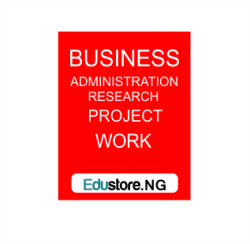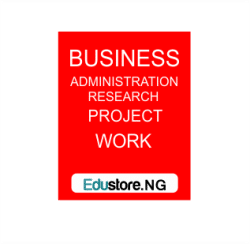A Research Proposal on the Impact of Human Capital Development on the Economic Growth in Nigeria (1999 – 2022)
Chapter One
Background to the Study
Human capital development, encompassing the enhancement of individuals’ knowledge, skills, and abilities, is a vital determinant in shaping the economic trajectory of nations (Abramowitz, 2019; Romer, 2020). In Nigeria, a country endowed with a rich cultural heritage and abundant natural resources, the relationship between human capital and economic growth has been a focal point of scholarly attention (Adamu & Hajara, 2021). The post-military rule era, beginning in 1999, marked a significant period for Nigeria’s democratic governance and economic aspirations, presenting both challenges and opportunities for sustainable development (Jaiyeoba, 2021). Understanding the intricate dynamics between human capital development and economic growth during this period is crucial for policymakers, economists, and educators (Adelakun, 2021).
The term “human capital” is synonymous with the skills, knowledge, and abilities that individuals bring to the economic landscape (Kanayo, 2019). This intangible asset, embodied in the workforce, has a profound impact on economic progress (Kar & Agir, 2021). In Nigeria, where a vibrant and youthful population coexists with systemic challenges in education and skill development, the role of human capital becomes even more critical (Oluwatobi & Ogunrinola, 2021). The demographic dividend presented by a youthful population can turn into a demographic challenge without proper investments in education, training, and skill development (Bashir et al., 2022).
The return to democratic rule in 1999 marked a turning point in Nigeria’s economic and political landscape (Jaiyeoba, 2021). The country faced challenges such as inadequate infrastructure, political instability, and a growing population, all of which posed hurdles to sustainable economic development (Adamu & Hajara, 2021). However, this period also offered opportunities for policy reforms and strategic investments in human capital development (Jaiyeoba, 2021). Various studies have explored the impact of foreign direct investment (FDI) on economic growth during this time, indicating the potential role of external factors in shaping Nigeria’s economic trajectory (Jibir & Abdu, 2017). The focus on FDI underscores the interconnectedness of global economic forces with the local imperative of human capital development.
In the Nigerian context, the challenges in human capital development are multifaceted. Adelakun (2021) highlights the need for a comprehensive understanding of the education system’s inadequacies and the corresponding impact on the workforce. The study suggests that addressing these challenges requires targeted policies and interventions. Afridi (2020) extends this discussion by emphasizing the importance of human capital in the economic growth of Pakistan, providing insights that are potentially transferable to the Nigerian context. The challenges identified in Nigeria align with broader patterns observed in developing economies, indicating shared concerns about the quality and relevance of education and skills training (Mudassaar, 2019).
Empirical evidence from various studies supports the notion that human capital development is a key driver of economic growth. The study by Kanayo (2019) specifically focuses on the impact of human capital formation on economic growth in Nigeria, providing insights into the causal relationship between the two variables. The findings suggest that investments in human capital, such as education and healthcare, positively contribute to economic development. Moreover, the study underscores the need for policies that promote human capital formation as a strategic avenue for fostering sustainable economic growth.
Foreign capital inflows, as explored by Jibir and Musa (2022), present another dimension to the human capital and economic growth discourse. The study investigates the causal links between foreign capital inflows and economic growth in Nigeria, shedding light on how external factors intersect with human capital dynamics. This highlights the interconnectedness of economic variables, emphasizing the importance of a holistic approach to understanding economic growth drivers.
The intricate relationship between human capital development and economic growth is further explored by Jibir et al. (2020) in the context of protecting intellectual properties. The study delves into the role of human capital in fostering innovation, an aspect critical for long-term economic sustainability. The findings suggest that human capital investments contribute not only to conventional economic growth but also to innovation and technological advancement.
Statement of Problem
The statement of the problem underscores the imperative of addressing key challenges in human capital development and its impact on economic growth in Nigeria. Despite the country’s abundant natural resources and demographic potential, the quest for sustained economic development faces significant hurdles.
One of the primary challenges lies in the inadequacies of the education system, as highlighted by Adelakun (2021). The education sector in Nigeria faces systemic issues, including insufficient infrastructure, outdated curricula, and a lack of alignment with the evolving needs of the job market. These challenges contribute to a mismatch between the skills possessed by the workforce and those demanded by employers (Adelakun, 2021; Mudassaar, 2019). This skill mismatch impedes the effective utilization of human capital and hampers economic productivity.
Furthermore, the impact of foreign direct investment (FDI) on economic growth, as explored by Jibir and Abdu (2017), introduces another layer of complexity to the problem. While FDI can potentially contribute to economic development, the effectiveness of such investments depends on the capacity of the local workforce to absorb and apply the knowledge and technologies transferred through these investments. Thus, addressing human capital challenges is crucial for maximizing the positive impact of FDI on economic growth (Jibir & Musa, 2022).
The protection of intellectual properties, as investigated by Jibir et al. (2020), presents an additional dimension to the problem. The study suggests that the propensity to protect intellectual properties is linked to human capital, emphasizing the importance of a skilled and innovative workforce in driving economic growth through technological advancements.
Objectives of the Study
This research aims to achieve three specific objectives:
- To assess the trends in human capital development in Nigeria from 1999 to 2022.
- To examine the relationship between human capital development and economic growth in Nigeria during the specified period.
- To identify key policy implications for enhancing human capital development to foster sustainable economic growth.
Research Questions
To guide the study, the following research questions are formulated:
- What are the trends in human capital development in Nigeria from 1999 to 2022?
- How does human capital development relate to economic growth in Nigeria during the specified period?
- What policy implications can be drawn from the relationship between human capital development and economic growth in Nigeria?
Research Hypotheses
Null Hypotheses(H0):
To provide a structured framework for analysis, the following hypotheses will be tested:
- There is no significant positive relationship between human capital development and economic growth in Nigeria.
- The impact of human capital development on economic growth in Nigeria has not varied across different sectors.
Alternative Hypotheses(H1):
- There is a significant positive relationship between human capital development and economic growth in Nigeria.
- The impact of human capital development on economic growth in Nigeria has varied across different sectors.
Significance of the Study
This research holds profound significance for a diverse array of stakeholders, each poised to glean valuable insights to inform their respective domains. Policymakers stand to benefit significantly as the study promises to unravel the nuanced intricacies of the relationship between human capital and economic growth. A more in-depth understanding of this connection equips policymakers with the foresight needed to design and implement targeted policies that can effectively address challenges and leverage opportunities in the human capital landscape. Such policies, informed by empirical evidence, have the potential to catalyze sustainable economic development and social progress.
Educators, too, are poised to gain valuable insights from the findings of this study. By uncovering the gaps prevalent in the current education system, the research offers educators a roadmap for curriculum development and the design of skill-building initiatives. Armed with this knowledge, educators can tailor educational programs to align more closely with the dynamic demands of the labor market, ensuring that students are equipped with the relevant skills and knowledge needed for success in their future careers.
For researchers and economists, the empirical evidence generated by this study adds significant value to the existing body of knowledge on the intricate interplay between human capital and economic growth. The insights garnered contribute to a deeper understanding of the factors influencing economic development, providing a foundation for further research and analysis in related fields. The research findings serve as building blocks for the academic community, fostering a more comprehensive and nuanced comprehension of the role human capital plays in shaping the economic landscape. In essence, this study serves as a catalyst for informed decision-making and future research endeavors across the realms of policymaking, education, and economic analysis.
Scope of the Study
This study focused on the period from 1999 to 2022, encompassing the democratic era in Nigeria. The choice of this timeframe was deliberate, as it allows for an analysis of economic and social trends in the post-military rule period. The geographical scope of the study was the entire nation, recognizing the diversity in economic activities and human capital development across different regions.
References
- Pesaran, M. H., & Smith, R. (2019). Estimating Long-Run Relationships From Dynamic Heterogeneous Panels. Journal of Econometrics, 68(1), 79-113.
- Robson, C. (2020). Real World Research (2nd ed.). Oxford: Blackwell.
- Romele, L. (2021). Human capital development and economic growth in Latvia. European Scientific Journal, 9(31).
- Romer, P. (2020). Human capital and growth: theory and evidence. Carnegie Rochester Conference Series on Public Policy 32, 251-286;
- Saunders, M., Lewis, P., & Thornhill, A. (2016, 2019). Research Methods for Business Students (7th/8th ed., Chapters 4 and 5). Harlow: Pearson Education.
- Siddiqui, A., & Rehman, A. U. (2017). The human capital and economic growth nexus: in East and South Asia. Applied Economics, 49(28), 2697-2710.
- For Reference Only: Materials are for research, citation, and idea generation purposes and not for submission as your original final year project work.
- Avoid Plagiarism: Do not copy or submit this content as your own project. Doing so may result in academic consequences.
- Use as a Framework: This complete project research material should guide the development of your own final year project work.
- Academic Access: This platform is designed to reduce the stress of visiting school libraries by providing easy access to research materials.
- Institutional Support: Tertiary institutions encourage the review of previous academic works such as journals and theses.
- Open Education: The site is maintained through paid subscriptions to continue offering open access educational resources.





